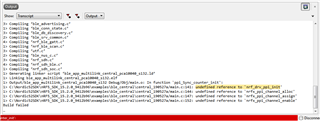OS in development environment :Windows7
HARD :(Taiyo Yuden)EBSHSN Series Evaluation Board : Central / Peripherals
CPU :(Nordic) nRF52832 / ARMR Cortex?-M4F 32 bit processor 28-pin Land Grid Array / 15GPIOs / SWD
Soft Ver:nRF5_SDK_15.2.0_9412b96
Please tell me the processing method to count variables by 100us without generating interrupt.
Please let me know if there is a sample program
Thank you very much.

